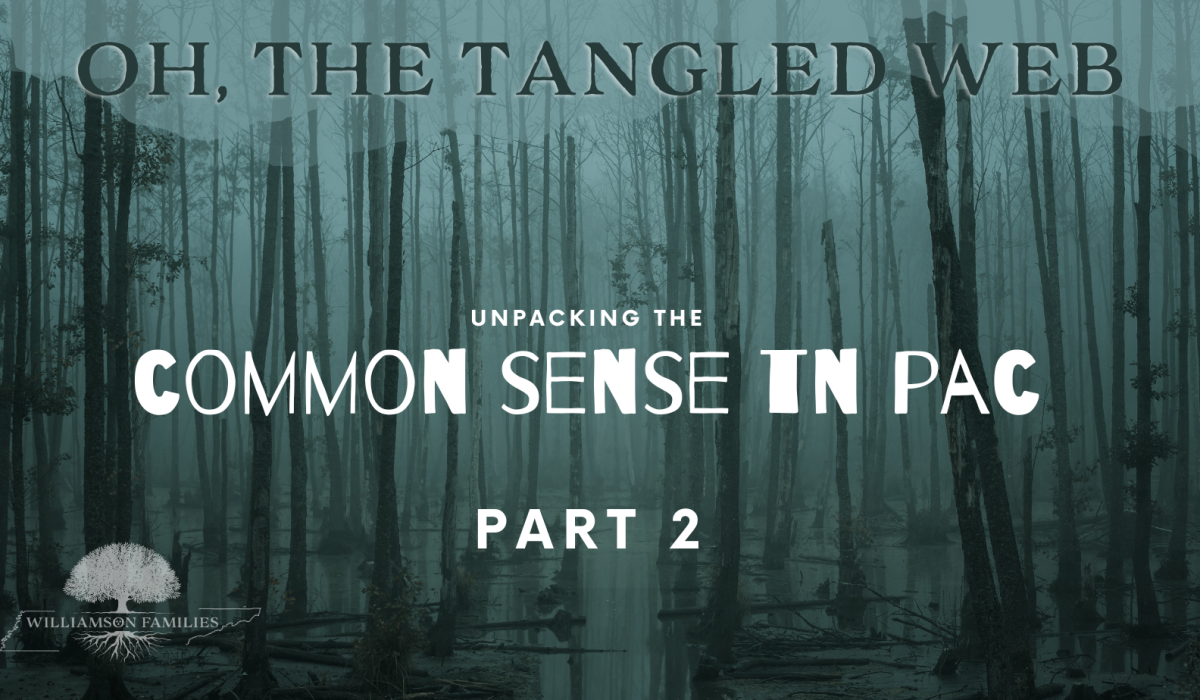Part 2 of 3: “The Nothingburger with a Surprising Amount of Meat.”
The City of Franklin Ethics Committee, comprised of retired judge Jim Martin[i] (Chairman), Juanita Patton (Vice Chairman), former Franklin mayor Jerry Sharber,[ii] and Reverend (Dr) Vona Wilson,[iii] voted on May 17, 2023 to dismiss ethics complaints against Moore & Brown.[iv] This dismissal appeared to be the end of the matter, but several troubling facts surround this committee, its formation, and the paucity of interest in delving into the complaints against Moore & Brown by both the committee and the broader middle Tennessee media.
Several, if not all, of the committee members appear to have a relationship with Moore, possibly calling into question their objectivity on this matter.[v] [vi] Even if that is not the case, the timing of its reformation should raise eyebrows.
The City of Franklin had not had an active Ethics Committee for over 10 years, prior to its formal reconstitution on March 21, 2023.[vii] City attorney, Shauna Billingsley, breezily excused this as a routine review of the municipal code and a sudden realization that the city needed an ethics committee. However, Billingsley isn’t new in her job; she’s been the city attorney since 2007[viii] and knowingly allowed this committee to fall into disuse. What caused her to suddenly reconstitute this moribund committee?
Moore & Brown’s actions took place between March & July 2022. A Freedom of Information Act (FOIA) request was filed sometime in June 2022 as evidenced by a June 23, 2022 email exchange between deputy city recorder Angie Johnson and city manager Eric Stuckey. This FOIA was apparently delivered August 4, 2022 based on the date stamp on the bottom of the evidence file. Not surprisingly, three months later Stuckey sponsored a discussion item at the November 22, 2022 BOMA work session highlighting the need to resurrect the ethics committee.[ix] The logical inference is that the mid-summer FOIA request and evidence contained therein caused concern among the mayor’s inner circle that he and Brown could be susceptible to political harm if this information became widely known. Therefore, an insurance policy in the form of a friendly ethics committee was developed. The true nature of this committee became apparent late the following spring.
Following Alderman Gabrielle Hanson’s comments regarding the Covenant massacre, numerous complaints poured into the City of Franklin offices. The ethics committee scheduled a May 17, 2023 public hearing to determine what action to recommend to the BOMA regarding Hanson. However, complaints regarding Moore & Brown also began to filter in, creating a dilemma—how to keep the true nature of Moore & Brown’s actions from a wider audience and more scrutiny. The ethics committee pivoted at their first official meeting on May 4th and delayed Hanson’s public hearing until June 15, 2023, while creating a no-public-comment vetting session on May 17th for all ethics complaints received to that point.[x] [xi]
The May 17th meeting amounted to kabuki theatre as the four committee members tediously dismissed the Hanson complaints due to lack of applicability to city ethics ordinances. When they reached the Moore/Brown complaints, their job became more difficult, but nonetheless ended with the same preordained result. After initially deflecting assertions that there may be state ethics violations and that the men could indeed support whomever they wanted in a political campaign, the board adroitly sidestepped the salient questions regarding use of city resources or official position to advantage the Ravener campaign.
Incomprehensibly, Judge Martin completely ignored a key piece of section 1-808, paragraph 2: “Officials or employees may not use or attempt to use their position to secure any privilege or exemption for themselves or others that is not authorized by the charter, general law, or ordinance or policy of the municipality.” (emphasis added).[xii] In his parsing of the code during the hearing, Martin focused strictly on privilege or exemption for Moore & Brown, without that for Ravener. He then gains acquiescence from the rest of the board and deftly moves on to the next line of the section dealing with intimidation (which he similarly dismisses out of hand, without consideration of the quid pro quo questions raised above). Ravener did obtain privilege that was not afforded to Bulso, his competitor. These privileges took the form of city sponsored events where he was made the focus of attention and received publicity during a political campaign, through official government email access to numerous city employees for campaign purposes, and through the overt politicking of Moore & Brown in their official capacities.
Why would Martin, a seasoned jurist, simply waltz past the most germane and important part of the statute with respect to the complaints? It’s also notable that Martin did this after posing the question about use of city resources and asking the rest of the board to “ruminate” on that while quickly moving through the real meat of the argument. Was he attempting to focus attention on the use of resources, while pushing the proceedings past the biggest issue with Moore/Brown? The lack of public comment, and the inability for legal representatives to object during this hearing, certainly played a role in facilitating this judicial sleight of hand.
Martin then moves through and dismisses section 3 of 1-808 on the technical definition of a for-profit enterprise. Viewing Ravener’s campaign strictly as an economic entity, this would be true, but ignores the fact that Ravener would indeed gain prestige, power, and perhaps derive some economic benefit for himself or others if he were to win the TN-61 seat with the assistance of Moore & Brown. The key part of this section that is ignored is that the BOMA could in fact approve such interaction, but neither Moore nor Brown requested such approval from their fellow elected officials.
The committee then refocused on section 2 of 1-807.[xiii] This time, Sharber took the lead in ignoring the facts in front of the committee. Sharber created his own narrow definition of private gain along the lines of what Martin had done with section 3 of 1-808. Sharber then focuses most of his attention on advantages Moore & Brown may derive (while casually dismissing those that Ravener would derive for his campaign). Martin then says the quiet part out loud: “So, Mr. Sharber, you’re not concerned over the use of municipal time, facilities, equipment, and supplies, because while that may not be a good thing to do, you can’t see how it resulted in a private gain to either the Mayor or the Alderman or to Mr. Ravener.” There you have it. Acknowledgement that municipal resources were indeed used by Moore & Brown for Ravener; but because Sharber chooses to define “private gain or advantage” so narrowly, he can justify not allowing a broader discussion of this matter at a public hearing. Sharber attempts to explain his position through laughably irrelevant examples that are not at all similar to what Moore & Brown actually did. Jerry Sharber then publicly states he believes it is ok for government officials to politick and use taxpayer resources to advance a political campaign. This is Ken Moore’s “mentor.”
Martin & Sharber were the two leaders of this charade and only brought Patton & Wilson in towards the end as window dressing to the proceedings. It is not surprising that Martin guided their discussions. This is evident as Martin coaxes an obviously flummoxed Wilson on the situation during pages 53-54 of the transcript. There is some discussion after this exchange about campaign finance considerations and it’s notable that both Wilson and Patton acknowledged there’s a lot the committee didn’t know regarding the legal boundaries of what Moore & Brown did. This would seem to indicate the committee should have sought further guidance and/or conducted additional research. However, Sharber jumps back into the fray by reminding everyone that the committee had already decided to dismiss the 1-808 concerns, so the discussion can only center on use of resources, not on whatever gain the parties may have encountered. Sharber then motions to dismiss all complaints against Moore & Brown and the board acquiesces.
Though disturbing, Americans have grown used to government officials covering for one another. What is still foreign is the idea that the media will cover for, instead of holding accountable, those entrusted with power. So it is with the Moore/Brown situation—a complete news blackout on this issue. Why?
The natural response would be that the ethics committee’s findings rendered the issue moot in their eyes. However, this story was known to news outlets before the May 17th hearing. The Williamson Herald, having run several previous stories regarding Alderman Hanson’s Covenant comments and the complaints they generated, included as a post script comment a blurb about ethics complaints against Moore & Brown in a May 5th story without further exposition or follow up.[xiv] Similarly, all major news outlets in middle Tennessee covered the Hanson complaints wall to wall and knew full well both when the ethics hearing would be and what the agenda was. Why no investigative reporting; no queries to City of Franklin public affairs for a statement?
At the May 17th hearing itself, there were reporters from the Tennessean and Williamson Herald, along with news cameras from two Nashville television stations. The focus was obviously on the Hanson complaints, but the agenda provided clearly showed complaints regarding Moore & Brown. The result was all complaints being dismissed, but the reporters dutifully covered only one side of the proceedings. Afterwards, WSMV reporter Marissa Sulek received the Moore/Brown evidence package (1, 2, 3), yet no follow up occurred.
This combined effort to suppress public knowledge regarding Moore & Brown’s actions is deeply disturbing and should give pause to all Americans concerned about truth and ethical conduct. It harkens back to the philosophical thought experiment “if a tree falls in the forest, but no one is around to hear it, does it make a sound?”
Part 3 of 3 coming soon: “Closing the Overton Window”
[i] https://www.williamsonherald.com/news/local_news/judge-james-g-martin-retires-from-recovery-court/article_7745d092-12cf-11ed-a6ee-83dae7088f71.html
[ii] https://williamsonsource.com/past-franklin-mayors-visions-lead-to-todays-growth/
[iii] https://harpethriverdistrict.org/district-staff/
[iv] https://www.tennessean.com/story/news/local/2023/05/17/franklin-board-of-aldermen-discuss-hanson-ethics-complaints/70223651007/
[v] https://www.williamsonherald.com/opinion/letters_to_editor/letter-to-the-editor-there-s-a-double-standard-at-play-when-it-comes-to/article_00f1bb84-3ddc-11ee-a281-770fdfd0819d.html
[vi] https://www.williamsonherald.com/opinion/letters_to_editor/letter-to-the-editor-recent-letter-regarding-ethics-commission-filled-with-disinformation/article_dd8c218e-4236-11ee-8c7d-27567ada3a01.html
[vii] https://www.williamsonherald.com/news/local_news/franklin-ethics-committee-has-new-members-convenes-for-the-first-time-in-years/article_e775c77a-e487-11ed-ae80-1fa75871ba18.html
[viii] https://www.linkedin.com/in/shaunabillingsley/
[ix] https://franklintn.portal.civicclerk.com/event/546/files
[x] https://civicclerk.blob.core.windows.net/stream/FRANKLINTN/dcd3fb0f-f829-4db1-95ca-8f4fb329038c.pdf?sv=2022-11-02&st=2023-10-02T06%3A17%3A10Z&se=2024-10-02T06%3A22%3A10Z&sr=b&sp=r&sig=MoIAdpCH0ZI23G0dWmoOYwgSYHEdsGGg%2BKZCSJIqqP4%3D
[xi] https://www.williamsonherald.com/news/local_news/ethics-committee-decides-to-vet-complaints-ahead-of-public-hearings-hanson-s-hearing-moves-to/article_96c5c9ec-eb80-11ed-bd71-83ff53e4694c.html
[xii] https://library.municode.com/tn/franklin/codes/code_of_ordinances?nodeId=PTIICOOR_TIT1GEAD_CH8ET_S1-808USPOAU
[xiii] https://library.municode.com/tn/franklin/codes/code_of_ordinances?nodeId=PTIICOOR_TIT1GEAD_CH8ET_S1-807USMUTIFAET
[xiv] https://www.williamsonherald.com/news/local_news/ethics-committee-decides-to-vet-complaints-ahead-of-public-hearings-hanson-s-hearing-moves-to/article_96c5c9ec-eb80-11ed-bd71-83ff53e4694c.html


